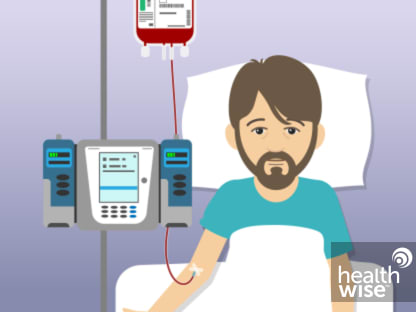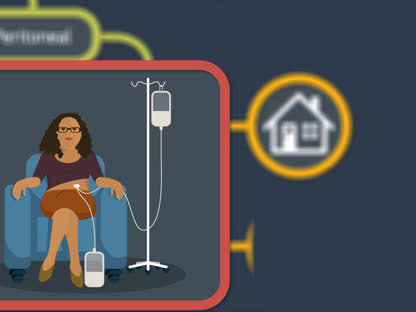E. Coli Infection From Food or Water
Condition Basics
What is an E. coli infection?
E. coli (Escherichia coli) is the name of a germ, or bacterium, that lives in the digestive tracts of humans and animals. There are many types of E. coli, and most of them are harmless. But some can cause bloody diarrhea. Some strains of E. coli may also cause severe anemia or kidney failure, which can lead to death. Other strains can cause other infections.
What causes it?
You get an E. coli infection by coming into contact with human or animal feces. This can happen when you drink water or eat food that's contaminated by feces. Or it can happen when you come in contact with an infected person who hasn't washed their hands well after a bowel movement.
What are the symptoms?
You may have symptoms like bloody diarrhea, stomach cramps, nausea, and vomiting. Symptoms usually start 1 to 4 days after you came in contact with E. coli. But some people don't notice any symptoms. If the infection is more serious, you may have a fever or other symptoms.
How is it diagnosed?
If your doctor thinks you may have an E. coli infection, they will ask you questions about your symptoms and do a physical exam. Your stool will probably be tested for E. coli.
How is an E. coli infection treated?
An E. coli infection usually goes away on its own. Your main treatment is to make yourself comfortable and drink sips of water to help prevent dehydration. In some people, the infection causes serious problems with the blood and kidneys. These people may need blood transfusions or dialysis.
Can you prevent it?
There are things you can do to prevent an E. coli infection. For example, cook ground meat to at least 160°F (71°C). Wash tools or kitchen surfaces that have touched raw meat. Use only treated, or chlorinated, drinking water. Wash your hands often, especially after handling raw meat and using the bathroom.
Cause
You get an E. coli infection by coming into contact with the feces, or stool, of humans or animals. This can happen when you drink water or eat food that's contaminated by feces. For example:
- E. coli can get into meat during processing. If the infected meat isn't cooked to 160 F (71 C), the bacteria can survive and infect you when you eat the meat. Other foods that can be infected with E. coli include raw milk or dairy products and raw fruits and vegetables.
- People can become infected when a contaminated city or town water supply hasn't been properly treated with chlorine. It can also happen when people accidentally swallow contaminated water while swimming in a lake, pool, or irrigation canal.
- The bacteria can also spread from one person to another. This most often happens when an infected person doesn't wash their hands well after a bowel movement.
Prevention
Food and water that are infected with E. coli germs look and smell normal. But there are some things you can do to prevent infection.
- Never eat raw or undercooked ground beef or pork.
- Cook ground meat to at least 160°F (71°C). Always use a meat thermometer.
- Make sure meat juices are clear or yellowish, with no trace of pink. Ground beef should be cooked until all pink color is gone.
- Wash your hands with hot, soapy water often.
- Always wash your hands after you touch raw meat, use the bathroom, or change diapers.
- Wash any tools or kitchen surfaces that have touched raw meat.
- Use separate cutting boards for raw meat and other food items.
- Use only pasteurized milk, dairy, and juice products.
- Use only treated, or chlorinated, drinking water.
- Be careful when you travel.
- When you travel to countries that may have unsafe drinking water, don't use ice or drink tap water.
- Avoid raw fruits and vegetables, except those with skin that you peel yourself.
Learn more
Symptoms
Children are more likely than adults to have symptoms of an E. coli infection. Most people with the infection will have:
- Severe stomach cramps and tenderness.
- Diarrhea, watery at first, but can become bloody.
- Nausea and vomiting.
Some people don't notice any symptoms. They may spread the bacteria to others without knowing it.
Symptoms usually start 1 to 4 days after coming in contact with E. coli.
Most people get better in about a week. They often don't see a doctor and don't know that E. coli caused their problems.
With some strains of E. coli, severe blood and kidney problems may occur within 2 weeks after the diarrhea starts. These problems can cause kidney failure and sometimes long-term disability or death in some children and older adults.
When E. coli causes serious problems with the blood or kidneys, symptoms include:
- Pale skin.
- A fever.
- Weakness.
- Bruising.
- Passing only small amounts of urine.
Exams and Tests
If your doctor thinks you may have an E. coli infection, they will ask you questions about your symptoms, such as:
- When did diarrhea start? How long has it lasted? How often do you have bowel movements?
- Is there blood in the diarrhea?
- Have you had chills or a fever?
- Have you had any belly cramps, nausea, or vomiting?
Your doctor will also do a physical exam. They will usually:
- Take your temperature.
- Take your blood pressure and measure your pulse rate.
- Look at your skin color to see if you are unusually pale.
- Check your stomach for tenderness.
- Do a rectal exam to find out if you have blood in your stool.
If your doctor suspects an E. coli infection, they will order a type of stool test that detects strains of E. coli.
Learn more
Treatment Overview
An E. coli infection usually goes away on its own. Your main treatment is to make yourself comfortable and drink sips of water. Diarrhea causes the body to lose more water than usual. This can lead to dehydration, which is especially dangerous for babies and older adults. Taking frequent, small sips of water will help prevent dehydration.
If you are not getting better, ask your doctor if you need treatment for E. coli. Some types of E. coli can be treated with antibiotics.
If you have bloody diarrhea that may be from an E. coli infection, don't take diarrhea medicine. These medicines can slow down the digestion process. This can allow more time for your body to absorb the poisons made by the E. coli.
In some people, the infection causes serious problems with the blood and kidneys. These people may need blood transfusions or dialysis.
Learn more
Watch
Self-Care
- E. coli usually goes away on its own. Most of the time, you don't need antibiotics.
- If you have diarrhea, don't use over-the-counter antidiarrheal medicine, such as Imodium or Maalox Anti-Diarrheal.
- When you feel like eating again, start with small amounts of food.
- To prevent dehydration, drink plenty of fluids. Choose water and other clear liquids. Soda, fruit juices, and sports drinks have too much sugar and not enough of the important electrolytes that are lost during diarrhea. These kinds of drinks should not be used to rehydrate. If you have kidney, heart, or liver disease and have to limit fluids, talk with your doctor before you increase the amount of fluids you drink.
- Wash your hands often. Always wash them after bowel movements.
Learn more
Credits
Current as of: September 30, 2025
Author: Ignite Healthwise, LLC Staff
Clinical Review Board
All Ignite Healthwise, LLC education is reviewed by a team that includes physicians, nurses, advanced practitioners, registered dieticians, and other healthcare professionals.
Current as of: September 30, 2025
Author: Ignite Healthwise, LLC Staff
Clinical Review Board
All Ignite Healthwise, LLC education is reviewed by a team that includes physicians, nurses, advanced practitioners, registered dieticians, and other healthcare professionals.




